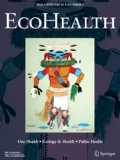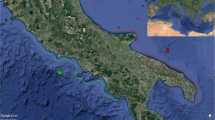Abstract
Disease problems caused by viral or bacterial pathogens are common in reptiles kept in captivity. There is no information available on the incidence of viral pathogens or the physiological cloacal bacterial flora of common free-living reptiles in Germany. Therefore, 56 free-living reptiles including 23 European adders (Vipera berus), 12 grass snakes (Natrix natrix) and 21 slow worms (Anguis fragilis) were investigated on the island Hiddensee in northeastern Germany. Pharyngeal and cloacal swabs were taken immediately after capture. Bacteriological examination was performed from the cloacal swabs to study the aerobic cloacal flora. Molecular biological examination included amplification of DNA or RNA from adeno-, rana- and ferlaviruses as well as culturing on Russell’s viper heart cells for virus isolation. Salmonella spp. were isolated from European adders but not from the other reptiles examined. The minimal inhibitory concentration was determined from the isolated Salmonella spp. However, some potentially human pathogenic bacteria, such as Proteus vulgaris, Aeromonas hydrophila, Klebsiella pneumoniae and Escherichia coli were isolated. Viruses were not detected in any of the examined reptiles. To the authors’ best knowledge, the present study is the first survey of viral pathogens in free-living snakes and slow worms in Germany and the first survey of cloacal aerobic bacterial flora of slow worms.

Similar content being viewed by others
References
Abbas MD, Marschang RE, Schmidt V, Kasper A, Papp T (2011) A unique novel reptilian paramyxovirus, four atadenovirus types and a reovirus identified in a concurrent infection of a corn snake (Pantherophis guttatus) collection in Germany. Veterinary Microbiology 150:70-79.
Ahne W, Batts WN, Kurath G, Winton JR (1999) Comparative sequence analyses of sixteen reptilian paramyxoviruses. Virus Research 63:65-74.
Allender MC, Mitchell MA, Phillips CA, Grusznski K, Beasley VR (2006) Hematology, plasma biochemistry, and antibodies to select viruses in wild-caught eastern massasauga rattlesnakes (Sistrurus catenatus catenatus) from Illinois. Journal of Wildlife Diseases 42:107–114.
Allender MC, Mitchell MA, Dreslik MJ, Phillips CA, Beasley VR (2008) Measuring agreement and discord among hemagglutination inhibition assays against different ophidian paramyxovirus strains in the Eastern massasauga (Sistrurus catenatus catenatus). Journal of Zoo and Wildlife Medicine 39:358–361.
Allender MC, Abd-Eldaim M, Schumacher J, McRuer D, Christian LS, Kennedy M (2011) PCR prevalence of Ranavirus in free-ranging eastern box turtles (Terrapene carolina carolina) at rehabilitation centers in three southeastern US states. Journal of Wildlife Diseases 47:759-764.
Ascher JM, Geneva AJ, Ng J, Wyatt JD, Glor RE (2013) Phylogenetic analyses of novel squamate adenovirus sequences in wild-caught Anolis lizards. PLoS One 8(4):e60977. doi:10.1371/journal.pone.0060977.
Blahak S, Ott I, Vieler E (1995) Comparison of 6 different reoviruses of various reptiles. Veterinary Research 26:470–476.
Boom R, Sol CJA, Salimans MMM, Jansen CL, Wertheim-Van Dillen PME, Van der Noordaa, J (1990) Rapid and simple Method for Purification of Nucleic Acid. Journal of Clinical Microbiology 28:495-503.
Brown RP, Roberts N (2008) Feeding state and selected body temperatures in the slowworm. Herpetological Journal 18:59–62.
Burnham BR, Atchley DH, DeFusco RP, Ferris KE, Zicarelli JC, Lee JH, Angulo FJ (1998) Prevalence of fecal shedding of Salmonella organisms among captive green iguanas and potential public health implications. Journal of The American Veterinary Medical Association 213:48–50.
Calle PP, Rivas J, Munoz M, Thorbjarnarson J, Holmstrom W, Karesh WB (2001) Infectious disease serologic survey in free-ranging Venezuelan Anacondas (Eunectes murinus). Journal of Zoo and Wildlife Medicine 32:320–323.
Chinchar VG (2002) Ranaviruses (family Iridoviridae): emerging coldblooded killers. Archives of Virology 147:447–470.
Cooper JE, Jackson OF (1981) Bacteria. In: Diseases of the Reptilia. London: Academic Press, pp 165-191.
Cooper JE (2000) Reptilian microbiology. In: Laboratory medicine: avian and exotic pets, Fudge AM (editor), Philadelphia: WB Saunders, pp 223–228.
Clinical and Laboratory Standards Institute (CLSI) (2008) Performance Standards for Antimicrobial Disk and Dilution Susceptibility Tests for Bacteria Isolated from Animals; Approved Standard, 3rd Ed. CLSI Document M31-A3. Wayne, PA: CLSI
de Matos AP, Caeiro MF, Papp T, Matos BA, Correia AC, Marschang RE (2011) New viruses from Lacerta monticola (Serra da Estrela, Portugal): further evidence for a new group of nucleo-cytoplasmic large deoxyriboviruses. Microscopy and Microanalysis 17:101-108.
de Matos AP, Caeiro MF, Vale FF, Crespo E, Paperna I (2013) Iridovirus-Like Viruses in Erythrocytes of Lacertids from Portugal. Microscopy and Microanalysis 28:1-7.
Doneley RJ, Buckle KN, Hulse L (2014) Adenoviral infection in a collection of juvenile inland bearded dragons (Pogona vitticeps). Austalian Veterinary Journal 92:41-5.
Ducklow HW, Boyle PJ, Maugel PW, Strong C, Mitchell R (1979) Bacterial flora of the schistosome vector snail Biomphalaria glabrata. Applied and Environmental Microbiology 38:667-72.
Ebani VV, Cerri D, Fratini F, Meille N, Valentini P, Andreani E (2005) Salmonella enterica isolates from faeces of domestic reptiles and a study of their antimicrobial in vitro sensitivity. Research in Veterinary Science 78:117-121.
European Committee on Antimicrobial Susceptibility Testing (EUCAST) (2012) EUCAST Definitions of Clinical Breakpoints and Epidemiological Cut-off Values. www.eucaast.org. Accessed 05 November 2012.
Geue L, Löschner U (2002) Salmonella enterica in reptiles of German and Austrian origin. Veterinary Microbiology 84: 79-91.
Gravendyck M, Ammermann P, Marschang RE, Kaleta EF (1998) Paramyxoviral and reoviral infections of iguanas on Honduran Islands. Journal of Wildlife Diseases 34:33–38.
Grimont PAD, Weill F-X (2007) Antigenic formulae of the Salmonella serovars. Paris, France: WHO Collaborating Centre for Reference and Research on Salmonella, Institut Pasteur.
Grosse-Herrenthey A, Maier T, Gessler F, Schaumann R, Böhnel H, Kostrzewa M, Krüger M (2008) Challenging the problem of clostridial identification with matrix-assisted laser desorption and ionization-time-of-flight mass spectrometry (MALDI-TOF MS). Anaerobe 14:242-249.
Hird DW, Diesch SL, McKinnell RG, Gorham E, Martin FB, Meadows CA, Gasiorowski M (1983) Enterobacteriaceae and Aeromonas hydrophila in Minnesota frogs and tadpoles (Rana pipiens). Applied and Environmental Microbiology 46:1423-5.
Jacobson ER, Adams HP, Geisbert TW, Tucker SJ, Hall BJ, Homer BL (1997) Pulmonary lesions in experimental ophidian paramyxovirus pneumonia of Aruba Island rattlesnakes, Crotalus unicolor. Veterinary Pathology 34: 450-459.
Johnson AJ, Pessier AP, Wellehan JF, Childress A, Norton TM, Stedman NL, Bloom DC, Belzer W, Titus VR, Wagner R, Brooks JW, Spratt J, Jacobson ER (2008) Ranavirus infection of free-ranging and captive box turtles and tortoises in the United States. Journal of Wildlife Diseases 44(4):851-863.
Krautwald-Junghanns M-E, Stenkat J, Szabo I, Ortlieb F, Blindow I, Neul A, Pees M, Schmidt V (2013) Characterization of Salmonella isolated from captive and free-living snakes in Germany. Berlin Münchener Tierärztliche Wochenschrift 126:209-215.
Kuroki T, Ishihara T, Furukawa I, Okatani AT, Kato Y (2013) Prevalence of Salmonella in wild snakes in Japan. Japanese Journal of Infectious Diseases 66:295-298.
Mao J, Hedrick RP, Chinchar VG (1997) Molecular characterization, sequence analysis, and taxonomic position of newly isolated fish iridoviruses. Virology 229:212–220.
Marschang RE, Becher P, Posthaus H, Wild P, Thiel HJ, Müller-Doblies U, Kaleta EF, Bacciarini LN (1999) Isolation and characterization of an iridovirus from Hermann’s tortoises (Testudo hermanni). Archives of Virology 144:1909–1922.
Marschang RE, Donahoe S, Manvell R, Lemos-Espinal J (2002) Paramyxovirus and reovirus infections in wild-caught Mexican Lizards (Xenosaurus and Abronia sp.). Journal of Zoo and Wildlife Medicine 33:317–321.
Marschang RE, Michling R, Benkö M, Papp T, Harrach B, Böhm R. (2003) Evidence for wide-spread atadenovirus infection among snakes. In: Proceedings of the 6th International Congress of Veterinary Virology, Saint Malo, August 24–27, 2003, p 152
Marschang RE, Papp T, Frost JW (2009) Comparison of paramyxovirus isolates from snakes, lizards and a tortoise. Virus Research 144:272-9.
Miller DL, Gray MJ, Storfer A (2011) Ecopathology of ranaviruses infecting amphibians. Viruses 3:2351–2373.
Miró E, Grünbaum F, Gómez L, Rivera A, Mirelis B, Coll P, Navarro F (2013) Characterization of aminoglycoside-modifying enzymes in enterobacteriaceae clinical strains and characterization of the plasmids implicated in their diffusion. Microbial Drug Resistance 19:94-99.
Mitchell MA, Shane SM (2000) Preliminary findings of Salmonella spp. in captive green iguanas (Iguana iguana) and their environment. Preventive Veterinary Medicine 45:297–304.
Ortlieb F, Dunst A, Mundt F, Blindow I, Fischer K (2012) Bissverletzungen durch Kreuzottern (Vipera berus) auf der Insel Hiddensee (Mecklenburg-Vorpommern) in den Jahren 2003 bis 2009. Zeitschrift für Feldherpetologie 19:165-174.
Papp T, Fledelius B, Schmidt V, Kaján GL, Marschang RE (2009) PCR-sequence characterisation of new adenoviruses found in reptiles, and the first successful isolation of a lizard adenovirus. Veterinary Microbiology 134: 233-240.
Papp T, Pees M, Schmidt V, Marschang RE (2010) RT-PCR diagnosis followed by sequence characterization of paramyxoviruses in clinical samples from snakes reveals concurrent infections within populations and/or individuals. Veterinary Microbiology 144:466-472.
Pasmans F, Martel A, Boyen F, Vandekerchove D, Wybo I, Immerseel FV, Heyndrickx M, Collard JM, Ducatelle R, Haesebrouck F (2005) Characterization of Salmonella isolates from captive lizards. Veterinary Microbiology 110:285–291.
Pees M, Schmidt V, Marschang RE, Heckers KO, Krautwald-Junghanns ME (2010) Prevalence of viral infections in captive collections of boid snakes in Germany. Veterinary Record 166:422-425.
Pees M, Rabsch W, Plenz B, Fruth A, Prager R, Simon S, Schmidt V, Munch S, Braun P (2013). Evidence for the transmission of Salmonella from reptiles to children in Germany, July 2010 to October 2011. Euro Surveill 18:20634.
Pohlon E, Ochoa Fandino A, Marxsen J (2013) Bacterial community composition and extracellular enzyme activity in temperate streambed sediment during drying and rewetting. PLoS One 8(12):e83365. doi: 10.1371/journal.pone.0083365. eCollection 2013.
Pund RP, Theegarten D (2008) Die Bedeutung der beweglichen Aeromonaden als Krankheitserreger für den Menschen. Bundesgesundheitsblatt Gesundheitsforschung Gesundheitsschutz 51:569-576.
Richards JM, Brown JD, Kelly TM, Fountain AL, Sleeman JM (2004) Absence of detectable Salmonella cloacal shedding in free-living reptiles on admission to the wildlife center of Virginia. Journal of Zoo and Wildlife Medicine 35:562–563.
Roggendorf M, Müller HE (1976) Enterobakterien bei Reptilien. Zentralblatt für Bakteriologie und Hygiene A 236:22-35.
Rosenthal KL, Mader DR (2006) Microbiology. In: Reptile Medicine and Surgery, Mader DR (editor), Philadelphia: WB Saunders, pp 227–235.
Schmidt V, Marschang RE, Abbas MD, Ball I, Szabo I, Helmuth R, Plenz B, Spergser J, Pees M (2013) Detection of pathogens in Boidae and Pythonidae with and without respiratory disease. Veterinary Record 172:236.
Schröter M, Roggentin P, Hofmann J, Speicher A, Laufs R, Mack D (2004) Pet Snakes as a Reservoir for Salmonella enterica subsp. diarizonae (Serogroup IIIb): a Prospective Study. Applied and Environmental Microbiology 70:613-615.
Stenkat J, Krautwald-Junghanns ME, Schmidt V (2013) Causes of morbidity and mortality in free-living birds in an urban environment in Germany. Ecohealth 10:352-65.
Stöhr AC, Blahak S, Heckers KO, Wiechert J, Behncke H, Mathes K, Günther P, Zwart P, Ball I, Rüschoff B, Marschang RE (2013) Ranavirus infections associated with skin lesions in lizards. Veterinary Research 44:84.
Street D (1979) The Reptiles of Northern and Central Europe. London: B.T. Batsford Ltd. p. 272.
Waterman SH, Juarez G, Carr SJ, Kilman L (1990) Salmonella arizona infections in Latinos associated with rattlesnake folk medicine. American Journal of Public Health 80:286–289.
Wellehan JFX, Johnson AJ, Harrach B, Benkő M, Pessier AP, Johnson CM, Garner MM, Childress A, Jacobson ER (2004) Detection and analysis of six lizard adenoviruses by consensus primer PCR provides further evidence of a reptilian origin for the adenoviruses. Journal of Virology 78:13366-13369.
Wellehan JF Jr, Childress AL, Marschang RE, Johnson AJ, Lamirande EW, Roberts JF, Vickers ML, Gaskin JM, Jacobson ER (2009) Consensus Nested PCR Amplification and Sequencing of Diverse Reptilian, Avian, and Mammalian Orthoreoviruses. Vet Microbiol 133:34-42.
Wuthe HH, Rohde R, Aleksić S, Schubert C, Wuthe S (1979) Über das Vorkommen von Angehörigen des Genus Salmonella bei freilebenden Schlangen in Norddeutschland. Zentralblatt für Bakteriologie, Mikrobiologie und Hygiene. 1. Abt. Originale A, Medizinische Mikrobiologie, Infektionskrankheiten und Parasitologie 243:412-418.
Acknowledgments
We thank the National Park Administration of Mecklenburg-Vorpommern, Germany, for the kind permission to investigate reptiles on the island of Hiddensee.
Author information
Authors and Affiliations
Corresponding author
Rights and permissions
About this article
Cite this article
Schmidt, V., Mock, R., Burgkhardt, E. et al. Cloacal Aerobic Bacterial Flora and Absence of Viruses in Free-Living Slow Worms (Anguis fragilis), Grass Snakes (Natrix natrix) and European Adders (Vipera berus) from Germany. EcoHealth 11, 571–580 (2014). https://doi.org/10.1007/s10393-014-0947-6
Received:
Revised:
Accepted:
Published:
Issue Date:
DOI: https://doi.org/10.1007/s10393-014-0947-6




